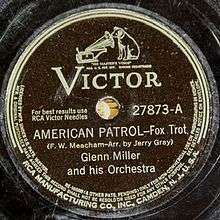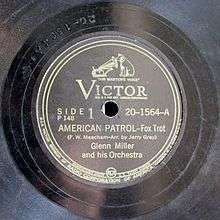American Patrol
| "American Patrol" | |
|---|---|
| (Introducing the "Red White and Blue") | |
 Sheet music cover (1885) | |
| Song | |
| Written | 1885 |
| Form | March |
| Writer(s) | F. W. Meacham |
| Language | English |

"American Patrol" is a popular march written by Frank White (F.W.) Meacham in 1885. It incorporates both original musical themes by Meacham and melodies from American patriotic songs of the era such as "Columbia, the Gem of the Ocean" and "Dixie." Composed for piano, it was then arranged for wind band and published by Carl Fischer in 1891. Copyright was assigned to Meacham's widow, Cora, in 1912 and renewed in 1919. Jerry Gray arranged a swing version of the march for Glenn Miller's orchestra in 1941, and Morton Gould later composed his own unusual and often dissonant "American Patrol for 3 Bands." The "patrol" format was popular in the second half of the 19th century, and other compositions bear titles such as "Turkish Patrol," "Ethiopian Patrol," "Owl's Patrol," "Welsh Patrol" and "Arab Patrol." The format was intended to represent a military band approaching, passing, and fading into the distance. It typically included an introduction played p or pp, in imitation of bugle calls or drums, then themes played progressively louder until a recapitulation of the first theme(s), gradually dying away and finishing pp, ppp, or even pppp. The original piano version of "American Patrol" follows this scheme.
Performances
It was performed by the Marine Band on July 2, 1892 in Portland, Oregon.[1]
The 1893 Annual Meeting of the American Street-Railway Association included a performance of American Patrol by Clauder's Exposition Band.[2] Also, in 1893, Conterno's Band and Orchestra performed it as part of their concert at Paradise Park in New York.[3]
In 1896, Halle's Concert Band performed it as part of Fourth of July celebrations at Winthrop Park in New York.[4]
1942 Glenn Miller recording


Glenn Miller recorded the song in 1942 in a swing arrangement by Jerry Gray, where the theme "The Girl I Left Behind" can be also heard as an overlay. The song was released as a Victor 78 single, 27873A, backed with "Soldier, Let Me Read Your Letter". The recording was reissued as RCA Victor 20-1564-A backed with "Song of the Volga Boatmen" as part of a 78 album. The record reached no. 15 on Billboard in 1942.[5]
The professor (actor Russel Johnson) performed this on a flute on the television series "Gilligan's Island" in episode 26 "Music Hath Charm".
References
- ↑ Heintze, James R. (2009). Music of the Fourth of July: A Year-by-Year Chronicle of Performances and Works Composed for the Occasion, 1777-2008. Jefferson, North Carolina: McFarland & Company. p. 214. ISBN 9780786439799.
- ↑ "Verbatim Report of the ... Annual Meeting of the American Street-Railway Association". 1893: 69. Retrieved 2 June 2016.
- ↑ Heintze, James R. (2009). Music of the Fourth of July: A Year-by-Year Chronicle of Performances and Works Composed for the Occasion, 1777-2008. Jefferson, North Carolina: McFarland & Company. p. 216. ISBN 9780786439799.
- ↑ Heintze, James R. (2009). Music of the Fourth of July: A Year-by-Year Chronicle of Performances and Works Composed for the Occasion, 1777-2008. Jefferson, North Carolina: McFarland & Company. p. 222. ISBN 9780786439799.
- ↑ "Song artist 6 - Glenn Miller". Tsort.info. 2007-10-08. Retrieved 2012-01-14.
- Bibliography
- Heintze, James R. (2009). Music of the Fourth of July: A Year-by-Year Chronicle of Performances and Works Composed for the Occasion, 1777-2008. Jefferson, North Carolina: McFarland & Company. ISBN 9780786439799.
- Meacham, F.W. "American Patrol" (Sheet music). New York: W.B. Gray & Co. (1885)
- Meacham, F.W. "American Patrol" (Sheet music). Philadelphia: Morris Music Publishing Company (914). (1885 copyright renewed 1912)
External links
- "American Patrol", New York Military Band (Edison Blue Amberol 3221, 1917)—Cylinder Preservation and Digitization Project.